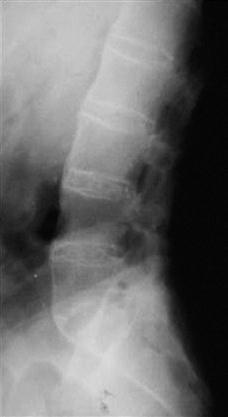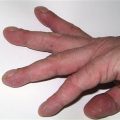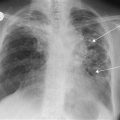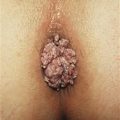Backache
Backache is one of the most common complaints seen in general practice and orthopaedic clinics. It accounts for about 20% of referrals to orthopaedic clinics. Most causes are either traumatic or degenerative but other causes are numerous and may occur as a result of pathology in almost any system of the body.
History
Congenital
The diagnosis is usually apparent from the history, although with spondylolisthesis, the symptoms, i.e. low lumbar backache, worse on standing, may not present until late childhood or early adult life.
Acquired
General
The speed of onset is important. Sudden onset back pain may be due to trauma or disc lesions, whereas gradual onset of pain may be due to conditions such as degenerative disease. Mechanical lesions impinging on the cord can result in neurological symptoms such as bladder dysfunction (urinary retention). Symptoms worse on movement and relieved by rest suggest a mechanical cause, whereas pain that is severe and unrelenting can occur with malignant causes. In addition, there may be symptoms (other than musculoskeletal) related to the underlying cause such as abdominal pain, dysuria or menorrhagia.
Traumatic
There will usually be a clear history of trauma. Care must be taken in moving the patient. Neurological sequelae may be obvious.
Infective
There may be a history of TB; the patient may have had night sweats or cough. Osteomyelitis of the spine may also occur in diabetes and the immunocompromised, in which case the organism is more commonly Staphylococcus aureus. With spinal TB, the patient is usually young and complains of malaise, fever, pain, tenderness and limitation of movement of the spine. Discitis usually presents with mild backache accompanied by leg pain.
Inflammatory
Ankylosing spondylitis usually affects young adult males. The sacroiliac joints are affected initially, then the whole spine. The patient usually presents with lumbar stiffness, especially when rising in the morning. Iritis and plantar fasciitis may also occur. Rheumatology disorders may present with symptoms in other joints.
Neoplastic
The patient is usually unwell with severe unrelenting pain, often localised to a particular area of the spine. There may be a past history of a primary tumour (e.g. bronchus, breast, thyroid, prostate or kidney) or the primary may not be apparent. The pain may have been of sudden onset with a pathological fracture resulting in a collapsed vertebra. Rarely paraplegia may be a presenting symptom. Myeloma may present with backache.
Degenerative
Osteoarthritis usually presents in the older patient, with pain made worse on movement and relieved by rest. With intervertebral disc lesions, there is usually sudden onset of pain radiating down the back of the leg (sciatica). The pain is worse on movement, coughing and straining. Neurological symptoms may be present, e.g. weakness of a limb or bladder symptoms.
Metabolic
Osteoporosis is commonest in post-menopausal women. Osteoporosis itself does not cause pain but pathological fractures of the vertebra may occur, causing pain. Bone pain and pathological fractures occur. Osteomalacia may occur in adults with a history of gastrectomy, steatorrhoea, renal failure or anticonvulsant therapy.
Endocrine
There may be a history of Cushing’s disease or long-term steroid therapy.
Idiopathic
Paget’s disease of bone may cause backache. This usually occurs over the age of 40 years. The patient may have noted other changes, e.g. enlargement of the face or bowing of the leg. Scheuermann’s disease is osteochondritis of the spine. It causes backache in adolescence. The patient may present because the parents have noticed round shoulders.
Psychogenic
This is very common. Check for malingering, anxiety, depression and compensation neurosis.
Visceral
With penetrating peptic ulcer, the patient complains of epigastric pain radiating straight through to the back. The pain may be relieved by food and antacids. With carcinoma of the pancreas, the patient will describe a boring pain in the back, which is unrelenting. There will be a history of anorexia and weight loss. The patient may be jaundiced. With carcinoma of the rectum, invasion of the sacrum and the sacral plexus may occur, causing low back pain with sciatica.
Vascular
Aortic aneurysm may cause back pain by eroding into the vertebral bodies. Alternatively, it may cause severe back pain due to rupture. The patient may have noticed a pulsation in the abdomen. Acute aortic dissection usually gives a severe tearing back pain associated with chest pain. The patient is usually shocked.
Renal
There is usually a dull, boring ache with carcinoma of the kidney. The patient may also complain of haematuria. With ureteric colic, the pain radiates from loin to groin and is severe, the patient being unable to get into a comfortable position. Inflammatory disease of the kidney presents with upper lumbar back pain. The patient may be feverish with rigors, and complain of frequency and dysuria.
Gynaecological
The pain is usually low back pain associated with pelvic discomfort. The patient may also complain of dysmenorrhoea, menorrhagia or post-menopausal bleeding.
Examination
General
Acute cord compression will cause bilateral leg pain with lower motor neurone signs at the level of the compression, and upper motor neurone signs below. Check for sphincter disturbance. Acute cauda equina compression causes root pain in the legs, saddle anaesthesia and disturbances of bladder and bowel function. In any patient with acute backache, the above signs should be sought and, if found, the appropriate urgent referral made to a neurosurgeon or spinal surgeon.
Congenital
Kyphoscoliosis and spina bifida are usually obvious on examination. With spondylolisthesis, a ‘step’ may be palpable in the line of the spinous processes, with a skin crease below. It usually involves L5 slipping on S1, or, less commonly, L4 slipping on L5. Occasionally, there are neurological signs in the limbs.
Acquired
Traumatic
This will usually be obvious. Careful positioning of the patient and full neurological examination should be carried out. Always check for associated injuries.
Infective
With acute osteomyelitis, there is pyrexia, malaise and local tenderness and spasm. With chronic osteomyelitis, e.g. due to TB, there will be wasting of the paraspinal muscles, spasm and restricted movements. There may be a localised kyphosis or ‘gibbus’ due to vertebral collapse. A psoas abscess may be present in the groin. Paraplegia may occur. With discitis, there will be reduced movement of the spine.
Inflammatory
The patient with ankylosing spondylitis will present with a stiff spine. There will be flexion of the hips and spine. In the advanced case, the patient cannot raise the head to see in front. Check for iritis and plantar fasciitis. Rheumatological disease will also present with problems in other joints.
Neoplastic
With myeloma, in addition to backache, there may be pain in the ribs, long bones and skull. Bone tenderness will be present with secondary deposits. Palpate along the spine for tenderness. Check the chest, thyroid, breast, kidney and prostate for malignancy. Check for any neurological signs.
Degenerative
There will be limitation of movement of the spine with osteoarthritis. With acute disc lesion, there will be limitation of spine movement, lordosis and neurological symptoms of the lower limbs. Carry out a full neurological examination.
Metabolic
There may be evidence of recent vertebral collapse. Loss of height and curvature of the spine may eventually occur. With osteomalacia, apart from bone pain, there may be proximal myopathy, resulting in a waddling gait.
Endocrine
There may be signs of Cushing’s disease or prolonged steroid therapy, e.g. cushingoid facies, buffalo hump, proximal myopathy, abdominal striae, etc.
Idiopathic
In Paget’s disease, check for changes in the skull and long bones (bowing of the tibia). Compressive symptoms due to skull enlargement may result in blindness, deafness or cranial nerve entrapment. There may be signs of high-output cardiac failure due to vascularity of bone. In Scheuermann’s disease, there will be a smooth, thoracic kyphosis and, below this, a compensatory lumbar lordosis. The chest is flat.
Psychogenic
This is often difficult to assess. Signs may vary from examination to examination. There may be exaggeration of symptoms during the examination. It is best to watch from a distance as the patient leaves the consulting room. The gait, posture and demeanour may suddenly change!
Visceral
Check for epigastric tenderness or mass. Jaundice may be present in pancreatic cancer, and the gall bladder may be palpable (Courvoisier’s law). Carry out a digital rectal examination to check for rectal carcinoma.
Vascular
A pulsatile abdominal mass may be palpable. The patient may be shocked. With acute aortic dissection, there may be shock with disparity of pulses in the extremities.
Renal
Check for renal masses or loin tenderness.
Gynaecological
Check for pelvic masses. Carry out bimanual examination.
General Investigations
■ FBC, ESR
Hb ↓ malignancy, peptic ulceration. WCC ↑ infection, e.g. osteomyelitis. ESR ↑ malignancy, e.g. myeloma or secondary deposits. TB. Ankylosing spondylitis.
■ CRP
↑ infection, inflammation.
■ U&Es
May be abnormal in renal disease.
■ LFTs
Bilirubin and alkaline phosphatase will be raised in biliary tract obstruction related to carcinoma of the head of the pancreas. Alkaline phosphatase may also be raised in Paget’s disease, osteomalacia and secondary deposits in bone. This is bony alkaline phosphatase that is raised and isoenzymes will need checking.
■ CXR
Primary tumour, e.g. bronchial carcinoma. Secondary tumours.
■ Spine X-ray
Trauma – fractures. Osteoarthritis – narrowed disc spaces and osteophytes. Prolapsed intervertebral disc – mild scoliosis, loss of lumbar lordosis, loss of disc space, Schmorl’s node. Spondylolisthesis – decapitated ‘Scottie dog’ sign. Scheuermann’s disease – wedging of vertebra and irregularity of vertebral end plates. Chronic osteomyelitis – erosion of joint surfaces, destruction of bone and intervertebral discs, soft-tissue shadows, e.g. psoas abscess. Myeloma – punched-out lesions. Secondary deposits – osteolytic or osteosclerotic (prostate). Osteoporosis – thinned bones, vertebral collapse. Ankylosing spondylitis – ‘bamboo’ spine; irregularity, sclerosis and fusion of sacroiliac joints. Paget’s disease of bone – ‘sclerotic’ white vertebrae.
Specific Investigations
■ Serum calcium
Raised in malignancy, myeloma and bony metastases.
■ Bence Jones protein
May be raised in myeloma.
■ Plasma protein electrophoresis
Monoclonal gammopathy in myeloma.
■ CT
Pancreatic lesions. Aortic lesions. Pelvic lesions.
■ Technetium scan
Hot spots with bony secondaries. Occasional hot spots with inflammatory disease.






